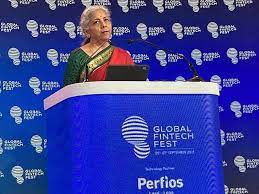Nirmala Sitharaman, Finance Minister
Speaking at the Digital Payments Awards 2025 Ceremony , Sitharaman said it is important to ensure that startup companies come up with solutions so that people are not arrested at home digitally, or fly by night operators don’t take away their money. Another major threat, she pointed out, is ‘deep fake’, which is causing a lot of damage to the public in large.
New Delhi: Finance Minister Nirmala Sitharaman on Wednesday asked fintech startups to come out with solutions to deal with the rising incidence of digital arrests, cheating by fly-by-night operators, and other kinds of cyber frauds.
Lauding the success of fintechs, the Finance Minister said they have helped in speeding up financial inclusion, and taking the payment system to even the far-flung areas of the country.
Speaking at the Digital Payments Awards 2025 Ceremony here, Sitharaman said it is important to ensure that startup companies come up with solutions so that people are not arrested at home digitally, or fly by night operators don’t take away their money.
Another major threat, she pointed out, is ‘deep fake’, which is causing a lot of damage to the public in large.
In just 3 years, nearly 700 entities as of Financial Year (FY) 2025 across banking, insurance, securities, and pensions have joined the Account Aggregator (AA) platform, up from only 24 in FY22, said Sitharaman.
Sitharaman noted the surge in adoption of the AA platform–a consent-based data-sharing framework aimed at improving access to financial services. The number of accounts linked through AA has soared to over 15 crore, compared to just 1.5 lakh in FY22.
Highlighted the rapid digital transformation in India’s financial ecosystem, Sitharaman said that the expansion of AAs platforms has facilitated loans worth over Rs 88,700 crore and empowered nearly 1 crore users to manage their personal finances more efficiently while significantly lowering onboarding costs for financial intermediaries.
“The number of accounts linked through AA has soared to over 15 crores, compared to a mere 1.5 lakh in FY22 – driving loans worth over Rs 88,700 crore and empowering nearly 1 crore personal finance management users, while lowering onboarding costs for intermediaries,” Sitharaman said.
Sitharaman encouraged fintech firms to look beyond urban markets. “Rural India is not just a social responsibility. It is a fertile ground for innovation, inclusion, and opportunity. The next big wave of growth lies in Bharat beyond the metros.”
“Today, we should take care of addressing them so we need a set of fintech companies which are constantly working to give solutions for the newer challenges which are arising,” Sitharaman said.
She also called upon the fintech sector to further expand the digital lending facilities to the key MSME sector.
Sitharaman further said Indian fintech innovations have the potential to become global public goods that can benefit other emerging and developed economies. This will open new markets for our firms.
International merchant payments through UPI are now accepted at select merchant outlets in seven countries, including Bhutan, France, Mauritius, Nepal, Singapore, Sri Lanka and the UAE.
“Our players must aim to export our successful models abroad and capture global markets. We have the talent, we have the market scale, and we have the proven solutions,” she said.
This, she said, will open up new markets for domestic firms.
Indian fintech market is projected to grow to over USD 400 billion by 2028-29.
“That’s not too far away. Just three years. Reflecting on an anticipated annual growth of 30 per cent. The scale of opportunity is immense. I firmly believe its best chapters are yet to be written.
“Together, let us ‘Innovate, Include, and Inspire’. Innovate new solutions fearlessly, include every citizen in your vision, and inspire the world with what India can achieve,” she said.
Noting that India now actually accounts for almost half of all real-time digital transactions in the world, she said direct benefit transfer (DBT) has saved a lot money by plugging leakages.
About Rs 44 lakh crore have been transferred through DBT since 2014 and Rs 3.48 lakh crore have been saved.
The Minister said the speed at which innovation is happening in India is just a dream for many other countries.
“Several advanced countries are nowhere close to the kind of momentum our fintech companies have achieved, not just in terms of progress in their respective areas, but also in creating entirely new paradigms. This is something which is very unique of the Indian fintech sector,” she said.
A World Bank study noted that through Digital Public Infrastructure (DPI), India achieved an 80 per cent financial inclusion rate in just six years.
Some observers who have gone through this report have said that this feat would have otherwise taken nearly 50 years, Sitharaman said.

